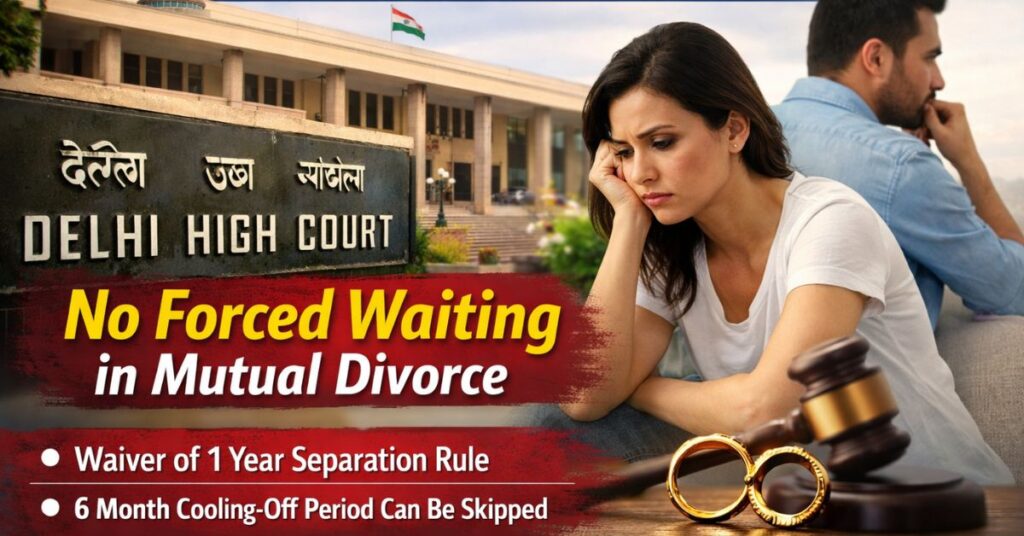In a significant ruling on August 5, 2024, the Delhi High Court granted a waiver of the six months period required under Section 13B(2) of the Hindu Marriage Act, 1955 for obtaining a divorce by mutual consent. The judgment in the case of Poonam & Anr. v. Nemo sheds light on the conditions under which this waiver can be granted, providing much-needed clarity for couples seeking a faster resolution to their marital issues.
Background of the Case
The appellants, Ms. Poonam and Mr. Nitin Rana, were married on December 1, 2018, according to Hindu rituals. The couple had a daughter born on January 10, 2020. Unfortunately, due to unresolved differences, they separated on February 1, 2022, and had been living apart ever since.
On July 20, 2023, they reached a settlement, where Mr. Nitin Rana agreed to pay ₹20,00,000 as a full and final settlement towards permanent alimony. It was also agreed that the custody of their child would remain with Ms. Poonam. Following this, the couple filed a first motion petition under Section 13B(1) of the HMA, which was accepted by the Family Court on July 23, 2024.
Subsequently, on May 21, 2024, they filed a second motion petition under Section 13B(2) of the HMA, seeking a waiver of the six months period. However, the Family Court dismissed this request, stating that the couple had not undergone court-ordered mediation or conciliation, raising concerns about whether sufficient efforts for reconciliation had been made.
Delhi High Court’s Decision on the Waiver of Six Months Period
The case was appealed to the Delhi High Court, where Hon’ble Mr. Justice Rajiv Shakdher and Hon’ble Mr. Justice Amit Bansal presided. The court referred the couple to the Delhi High Court Mediation and Conciliation Centre, hoping for a reconciliation. However, the mediation process confirmed that the differences between the parties were irreconcilable, leaving no room for reconciliation.
The court referred to the Supreme Court’s ruling in Amardeep Singh v. Harveen Kaur (2017) 8 SCC 746, which laid down the criteria for granting a waiver of the six months period under Section 13B(2) of the HMA. The key considerations include:
- The statutory period of one year of separation and the six months waiting period is already completed before the first motion.
- All attempts at mediation or conciliation have failed, with no hope for reconciliation.
- The parties have genuinely resolved their differences, including issues related to alimony and child custody.
- The six months waiting period would only prolong the agony of the parties.
In this case, the court noted that the couple had been separated for over three years, and their efforts at mediation had been unsuccessful. Additionally, the settlement agreement demonstrated that all outstanding issues between the parties had been resolved.
Conclusion
The Delhi High Court’s decision to grant a waiver of the six months period required under Section 13B(2) of the HMA was based on the unique facts of the case. The court concluded that adhering to the waiting period would only prolong the misery of the parties involved. The Family Court was directed to pass appropriate orders on the second motion petition, with the couple set to appear on August 7, 2024.
This judgment underscores the court’s authority to grant a waiver of the six months period when the conditions outlined by the Supreme Court are met. It provides crucial guidance for couples seeking an expedited divorce process when all efforts at reconciliation have failed, and mutual consent has been reached.




